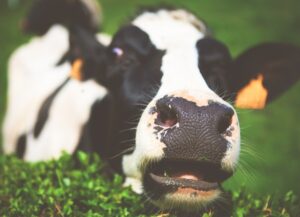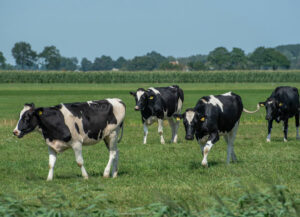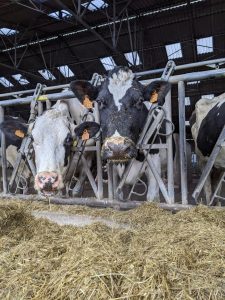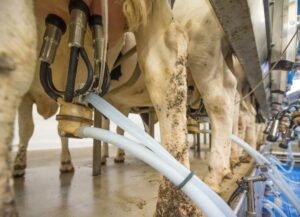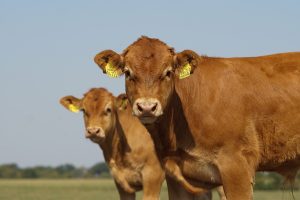Alvaro Garcia
Diarrhea or scours is the first leading cause of death in un-weaned heifer calves. It occurs most frequently between days 3 and 30 after birth, depending on the susceptibility of the individual animal and the cause of this multifactorial problem. According to the 2011 National Animal Health Monitoring System survey, diarrhea and digestive problems affect 25.3% of pre-weaned heifers and of these, 18.2% are treated. In addition, death rate in pre-weaned heifers is 7.8% with diarrhea accounting for 56.5% of this mortality.
Diarrhea is affected by pathogen exposure, calf management, environmental conditions, nutritional and immune status. Adequate amount and timely intake of colostrum is critical for calves to survive it. Once the intestinal epithelium is “closed” (first 1-2 days) to the initial absorption of large molecules, it then acts as a barrier to pathogens. The intestinal integrity of this epithelium is then critical to protect the young calf from bacterial challenges. It has been suggested that Zn is essential for normal function of this intestinal barrier, and the regeneration of its damaged epithelium.
A recent study looked at the objectives of feeding a Zn chelate (Zn-glycine; 16% Zn and 36% glycine) on performance and fecal score of pre-weaned dairy calves. The experiment used 72 Holstein female calves with a birth weight of 38.9 ± 2.9 kg from day 3 to day 80 of age. Calves received at least 4 liters of colostrum within the first 12 hours after birth and were assigned to three treatments on their third day of life. All calves received four liters of whole milk per day twice a day from days 3-12, six liters on days 13-40, four liters on days 41- 50, three liters on days 51-60, and two liters (in 1 meal) from days 61-65 (weaning). The treatments were 1. control with no Zn supplement (CON); 2. 100 mg/d of chelated Zn in milk (days 3 to 65; Zn3); top-dressed post weaning, 3. 100 mg/d chelated Zn in milk (days 50 to 65; Zn50); top-dressed post weaning. Concentrate was offered ad libitum since the beginning of the experiment to all calves.
Intake and body variables
No effects were observed on feed intake (DMI) during the first month of the experiment. During the second month however, the calves receiving Zn increased DMI. Those in the Zn50 group increased DMI around weaning day at 2100 g DM/day, while those on the other two treatments only consumed 1860 g DM/day.
Initial body weight and weight at day 30 were not different among all three treatments. However, body weight at weaning (day 65) and at the end of the study (day 80) was greatest for Zn3 compared to the other two groups. There were no differences in weight gains during the first month of life, however, during the second month Zn3 calves gained more than Zn50. As a result, there was a trend throughout the experiment for the Zn3 group to have higher weight gains compared with Zn50. It is possible that fortifying diets with zinc chelates during stress periods in calves, may enhance their ability to cope with stress and disease and thus improve weight gains. Feed efficiency however was not affected by Zn supplementation. Calves on the Zn3 treatment were taller (Wither height) on day 80 compared to the other groups. Long-term Zn supplementation (Zn3) also led to a reduction in lose feces for the duration of the study.
Circulating Zn gradually dropped with age but was always greater for Zn3. In the Zn50 calves, Zn initially increased, then decreased until weaning, only to rise suddenly after weaning. Calves receiving Zn had greater Zn concentrations throughout the study, mostly as a result of the Zn3 treatment. It is also important to note that Zn3 calves had greater blood glucose concentrations. Overall, Zinc supplementation led to elevated glucose compared to CON group during pre- but not postweaning.
Results of this experiment suggest, as would be expected, that the best moment to reduce days with loose feces is to supplement Zn during the first month of life. There were no effects on the consistency of the feces during the second month. It has been suggested that the mechanism by which this occurs might be by decreasing the permeability of the intestinal mucosa to exogenous pathogens. Zinc improves the enzyme functions at the intestinal brush border and helps with the repair of the intestinal mucosa.
Additional potential roles of Zn that deserve consideration are enhanced cell-mediated immunity and the electrolyte secretion and absorption mechanisms in the intestine. From a practical standpoint 100 mg per day of a Zn chelate supplement in milk and concentrate during the first 65 days of life life reduced days with loose feces during the first month. Long term Zn supplementation when started early on life, had also positive effects on overall DMI.
Reference
Adab, M., Mahjoubi, E., Yazdi, M.H., Collier, R.J. 2020. Effect of supplemental dietary Zinc and its time of inclusion on pre-weaning phase of Holstein heifer calves: Growth performance and health status. Livestock Science. 231: 103891.
© 2020 Dairy Knowledge Center, LLC. All Rights Reserved.



